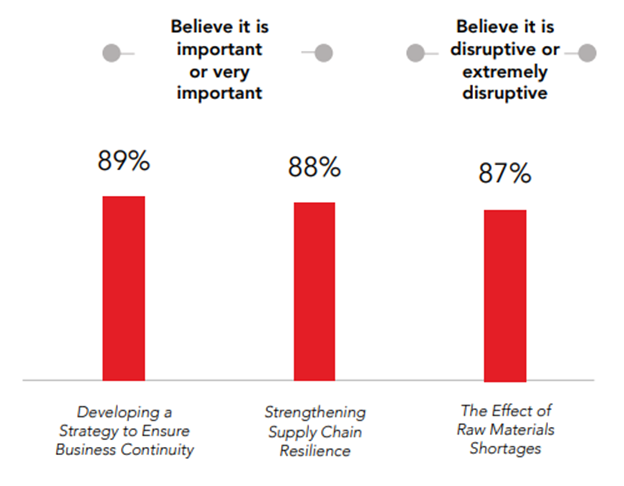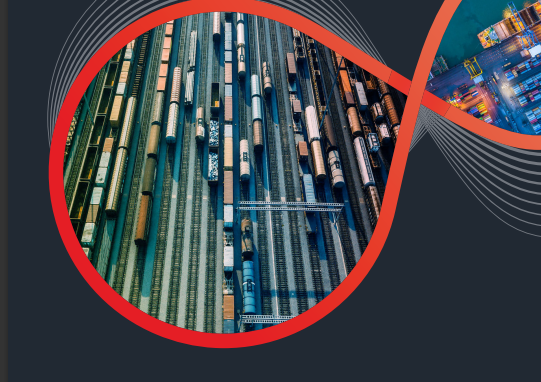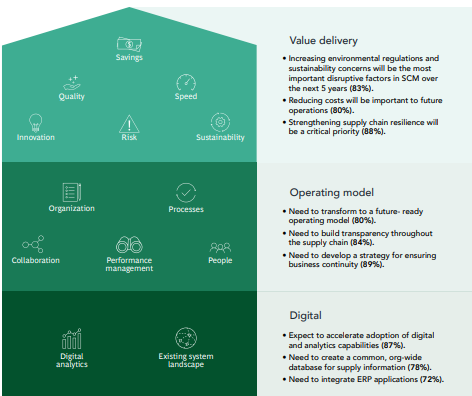This is an excerpt of the report “The Future of Supply Chain Management 2021–2025: Balancing Sustainability, Resilience and Cost”, focusing on the topic above. For the Executive Summary of the report, please, refer to the second part of this post.
CAPS Research, BCG
Bryan Fuller, Geoff Zwemke, Daniel Weise, Alex Dolya, Chitt Jha
May 2022
The Need to Improve Supply Chain Resilience
The pandemic made companies painfully aware that they need to bolster their resilience in the face of unexpected changes.
- In the survey, 88% of respondents said making the supply chain more resilient will be a critical priority in the coming years.
- Nearly 60% expect periodic shortages of raw materials to occur, and 87% believe these shortages will be extremely disruptive to operations.
- An overwhelming majority of respondents emphasized the importance of business continuity. To achieve it, 88% said that supply chain resilience needs to be strengthened (Figure 3).
An overwhelming majority of respondents emphasized the importance of business continuity. To achieve it, 88% said that supply chain resilience needs to be strengthened
Figure 3: Disruptions and the importance of developing supply chain resilience and business continuity

“Through numerous rounds of ISM® research on pandemic supply chain impacts, the need for resilience, risk management and agility became highly visible and critical for supply chain teams.
Organizations are tasked with ensuring minimal disruption to the continuity of resources, and that now requires a resilient approach.” — Tom Derry — CEO of the Institute for Supply Management® (ISM)
To achieve greater resilience, companies will need to make changes to their processes, including improving their communications.
- Nearly all of the survey respondents (95%) agree that building better relationships and fostering collaboration among supply chain partners will be essential to success.
- Respondents also say gaining better Tier-N visibility into supplier operations will improve their response to disruptions, and
- 78% say better sharing of knowledge within and among departments will help them align their goals and deal with problems faster.
Companies cited the importance of carrying excess stock in case of emergencies and strengthening cybersecurity measures to prevent disruptive attacks.
BCG research has found that resilient companies experience less impact than others when a shock occurs, and they also recover faster. That ultimately strengthens the bottom line.
A recent BCG report, “Transform for Resilience: An Imperative for Good Times Too ,“ found that two-thirds of companies designated as long-term high performers were able to handle shocks better than their peers.
EXECUTIVE SUMMARY

The Future of Supply Chain Management 2021–2025: Balancing Sustainability, Resilience and Cost [Executive Summary]
CAPS Research, BCG
Bryan Fuller, Geoff Zwemke, Daniel Weise, Alex Dolya, Chitt Jha
May 2022
The Future of Supply Chain Management
Every five years, the Center for Advanced Procurement Strategy (CAPS), a joint initiative of the Institute for Supply Management (ISM) and Arizona State University, conducts a global survey of practicing supply chain executives and knowledge experts, asking about the challenges they expect to face and their strategies and performance goals in the coming years.
For the 2021 survey, CAPS worked with BCG to query 157 supply management leaders across industry segments, including discrete manufacturing, process manufacturing, and service industries.
We gained their insights on a host of important topics, including:
- Supply chain market dynamics
- Cost savings and efficiency
- Risk and resilience
- Environmental, social, and governance (ESG) regulations and initiatives
- Supplier management
- Supply chain operations
- Human resources
- Technology
Key Insights from Procurement and Supply Chain Leaders
Two trends in the new survey stand out.
First, fulfilling environmental, social, and corporate governance (ESG) goals has assumed paramount importance.
The second notable trend is a greater emphasis on achieving resilience in the face of unpredictable raw materials shortages and logistical challenges, which were greatly exacerbated by the pandemic.
Two trends in the new survey stand out: (1) fulfilling environmental, social, and corporate governance (ESG) goals ; (2) … a greater emphasis on achieving resilience
The schematic below summarizes some of the survey’s most important findings.
Summary Figure: Highlights from the 2021–2025 CAPS and BCG global survey of procurement leaders

ZOOM VIEW

Value delivery
- Increasing environmental regulations and sustainability concerns will be the most important disruptive factors in SCM over the next 5 years (83%).
- Reducing costs will be important to future operations (80%).
- Strengthening supply chain resilience will be a critical priority (88%).

Operating model
- Need to transform to a future- ready operating model (80%).
- Need to build transparency throughout the supply chain (84%).
- Need to develop a strategy for ensuring business continuity (89%).

Digital
- Expect to accelerate adoption of digital and analytics capabilities (87%).
- Need to create a common, org-wide database for supply information (78%).
- Need to integrate ERP applications (72%).
“Going forward, CPOs will need to constantly balance tradeoffs between sustainability, resilience and cost.
CPO KPIs and capabilities will need to evolve respectively to reflect all these priorities. This will be the most challenging task for the next five years,” — Alex Dolya
CPOs need also to rethink through their approach to suppliers, given their need to balance priorities.
If in the past, cost savings were primary objective of supplier engagement, today CPOs need to ensure that suppliers can deliver in the face of decarbonization, supply resilience and cost competitiveness.
Getting the equation right could prove tricky.
CPOs need also to rethink through their approach to suppliers, given their need to balance priorities. Getting the equation right could prove tricky.
Structure of the report
· The Future of Supply Chain Management
· Key Insights from Procurement and Supply Chain Leaders
· The Rising Importance of Sustainability
· The Need to Improve Supply Chain Resilience
· Sustainability and Resilience Top Cost Concerns
· 2021 vs. 2016: Different Change Drivers, Different Strategies
· Upgrading Supply Chain Technology
· Looking Forward
Report Authors
Bryan Fuller
Senior Director, Procurement, Solidigm, Former Executive Director, CAPS Research
Geoff Zwemke
Director of Product, CAPS Research
Daniel Weise
Managing Director and Partner, BCG, Global Leader for BCG Procurement Practice, CEO of Inverto
Alex Dolya
Managing Director and Partner, BCG, Asia Pacific Leader for BCG Procurement Practice, Global Leader for Procurement and SCM in Energy and Mining, BCG
Chitt Jha
Partner and Associate Director, BCG, BCG Global Expert on Procurement Resilience, Sustainability, and Digital
Originally published at CAPS Research.













